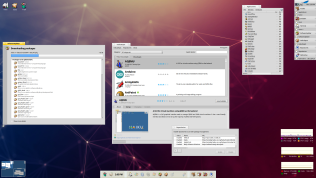Featured articles
DevOps for the Sinclair Spectrum! A series of articles exploring a modern development environment for the classic 8-bit 1980s home computer
Haiku Package Management: A tour of the unique package management capabilities of the alternative Haiku Operating System
Amiga Systems Programming in 2023: A look at developing, packaging and distributing software for AmigaOS and derivatives
Recent Posts
Tiller 0.7.6 and environment JSON v2
I recently released Tiller 0.7.6 with a new feature for the environment_json plugin. This can be used to provide dynamic configuration for Docker containers, using JSON in an environment variable. I previously posted a complete example of how you’d make use of this. However, most Tiller plugins provide values as “global” sources, which will be over-ridden by local, template-specific values. The documentation makes note of this in the “Gotchas” section, but there’s now anot...
Tiller 0.7.0 and simpler configuration files
Yesterday, I released Tiller 0.7.0, and as you might imagine with a version “bump” from the 0.6.x series, there’s a few changes. Some of it is internal stuff that you’ll probably only notice if you’re building your own plugins for Tiller, but there is a fairly big new feature for end users: Single-file configuration.
Centralized Docker container configuration with Tiller
If you’ve been using Docker for a while, you probably know that you can use Tiller to generate configuration files inside your containers. This means you can provide a single container for running in a variety of different environments (think of a web application that needs different database URIs and credentials depending on where it is run).
Tiller 0.5.0 released
Just a quick “heads up” for users of Tiller - version 0.5.0 has just been released and has a few new features, and some other changes. Firstly, I have added support for per-environment common settings. Normally, you’d do things like enable the API, set the exec parameter and so on in common.yaml, but as per issue #10, you can now specify / over-ride these settings in your environment configuration blocks. Simply drop them under a common: section, e.g.
Tiller 0.3.0 and new Defaults datasource
Tiller v0.3.0 has just been released, which brings a couple of changes. The first is that the ordering of plugins specified in common.yaml is now significant. Tiller will run these plugins in the order that they are specified; this is important as before the order was effectively random, so your templates may change with this release if you rely on merging values from different sources (hence the major version bump indicating a breaking change).



